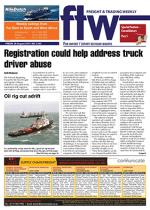The freight industry has
been warned to be on
high alert in light of the
increasing number of
scams reported recently.
And since scammers don’t
discriminate, the groupage
industry is equally vulnerable.
The first rule, says Johan
Robinson, operational
manager of Combined Private
Investigations (CPI), is never to
do business with an unknown
entity.
“Larger companies have
several processes and systems
in place to be followed before
transactions are made which
is why these criminals target
smaller companies.
As economies around the
world have slowed down and
small businesses have come
under pressure they have
also become easier targets for
criminals.”
According to Robinson, the
first rule of thumb in avoiding
fraud is to know whom you are
dealing with.
“Make sure the company is
real. Do an online search, find
a physical address, a landline
number if possible. It will not
take that long and may just save
you a lot of money. Also
try to find references
on them.
“It’s also very
important to
do a credit
check and
if you are
hesitant at
any point
rather walk
away,” he
advises. “Once
you have done this
and are going ahead with
the transaction then remember
that supporting documentation
regarding the shipment or
cargo should be obtained before
a transaction is concluded.”
FTW recently reported that
organised crime syndicates
claiming to be legitimate
businesses were targeting
forwarding companies.
Although fake credentials
are used, their requests are
credible enough. Once they
have obtained a quote for the
import or export of goods
they make a payment
from a credible
bank account but
invariably for
a much larger
sum of money.
They then call
saying they
have overpaid
and ask to be
refunded. The
cheque used to
make the initial
payment however is
fraudulent. The company is
thus refunding money it has
never really received.
Robinson says it is never
a good idea to send money
to companies one does not
know or has never dealt with
without taking the necessary
precautions.
“It is imperative that all
transactions are first verified
with the client’s accounts
department before any
payments are effected,” says
Robinson. “In a case where
there’s been an “overpayment”,
the person dealing with the
transaction should involve
top management before any
refunds are made, while all
cheques should be verified
with the bank before deposits
are made. The company
issuing the cheques should be
contacted and the issuing of
the cheque verified – and not
with the person who is trying
to do the transaction but
with a manager or a director.
Speak to your own bank
about the verification of the
cheque.”
Robinson says any handwritten
notes without a
company letterhead should
raise immediate red flags.
“It really is about following
sound business practices at all
times,” he said.
How to beat industry scammers
28 Aug 2015 - by Liesl Venter
0 Comments
FTW - 28 Aug 15

28 Aug 2015
28 Aug 2015
28 Aug 2015
28 Aug 2015
28 Aug 2015
28 Aug 2015
28 Aug 2015
28 Aug 2015
28 Aug 2015
28 Aug 2015
28 Aug 2015
